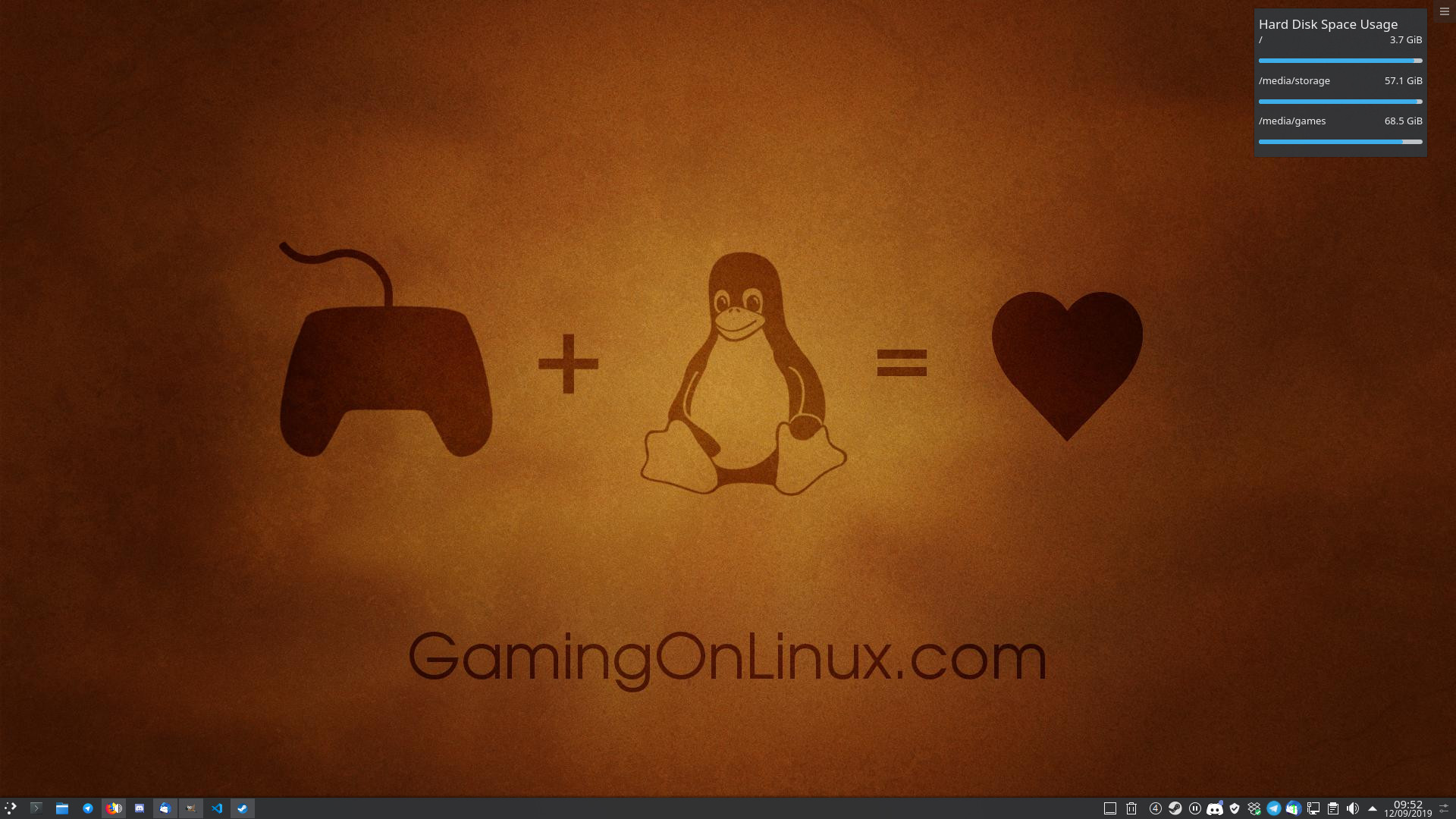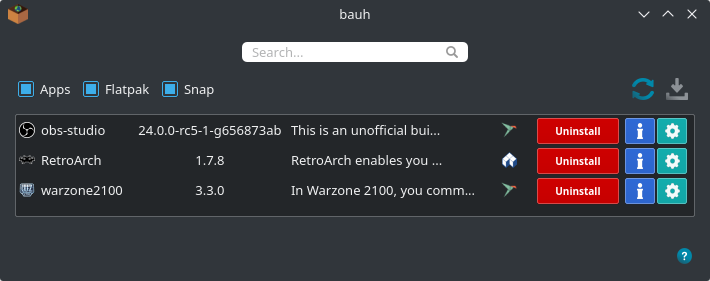Manjaro, the Linux distribution based on Arch has just put out a major new release with Manjaro 18.1.0 - Juhraya.
Something of a controversial decision was the Manjaro team were possibly going to replace the FOSS office suite LibreOffice in favour of the proprietary FreeOffice. After they took on plenty of feedback, they decided to drop that plan. Instead, when installing you now get the choice between the two or no office suite at all. Additionally according to what the Manjaro team said, SoftMaker (the developer), actually expanded FreeOffice to support more Microsoft formats due to the demand from the Manjaro community so thats' quite nice.

Pictured: Manjaro KDE Plasma Edition.
One of the other big additions in this release is the inclusion of their new software store named "bauh" (formely fpakman).
Bauh is a graphical package manager for both Snaps and Flatpak giving you the best of all worlds. So Manjaro now supports Snaps, Flatpaks and the Arch AUR.
You can download it here where it gives you a choice between XFCE 4.14, KDE Plasma 5.16, GNOME 3.32 or Architect which enables you to customise basically anything.
If you missed some recent Manjaro news, they actually formed a company to work on it professionally.
Personally, I've been using Manjaro now for around two months as my main daily driver and it has been a fun experience. I was fully expecting at least some kind of instability but it has been really smooth.
Like my wallpaper? You can download the source file here. It's under the CC0 1.0 Universal (CC0 1.0) Public Domain Dedication license (info), created by Frank during one of our older competitions.
Quoting: DorritI find Snaps/Flatpaks and AUR mutually exclusive.How so? I use Manjaro for like 1 year now, and I use some packages from AUR and some from Flatpak and they work very good. Please elaborate...
Quoting: DorritI find Snaps/Flatpaks and AUR mutually exclusive.while i generally prefer the AUR, if for example there is no -bin in the AUR and compiling takes ages, i'd prefer a flatpack over it ;)
Quoting: DorritPlease elaborate...When I said AUR I meant the rolling release model which, in my opinion, makes Snaps/flatpaks irrelevant since programs are always up to date without the negatives: large install files, slow to open, non-use of system themes and fonts.
Until then I will continue to use Mint.
A couple years back I ran Manjaro Gnome on my desktop and I wondered about the infrequency of security updates. They seemed far less frequent than I was used to getting on Ubuntu. Before I got around to looking into it, I borked my rig and the point was moot.
Apropos of nothing, I cannot break myself of the habit of pronouncing it "Man-haro", as if it were a Spanish word. XD
Last edited by Nanobang on 12 Sep 2019 at 12:40 pm UTC
Quoting: rat2000Just with the added negatives of cluttering up your system packages and having to read/trust random pkgbuilds of course. Not to mention the lack of built in sandboxing. Have you experienced GNOME/KDE issue a notification asking if you'd like to allow an app to take a screenshot/record/open files rather than being able to do so by default? It's rather nice.Quoting: DorritPlease elaborate...When I said AUR I meant the rolling release model which, in my opinion, makes Snaps/flatpaks irrelevant since programs are always up to date without the negatives: large install files, slow to open, non-use of system themes and fonts.
You're also lumping issues with snaps into flatpaks. Flatpaks can respect the system theme and aren't slow.
Last edited by drlamb on 12 Sep 2019 at 2:21 pm UTC
Quoting: rat2000I can see a couple of reasons to use themQuoting: DorritPlease elaborate...When I said AUR I meant the rolling release model which, in my opinion, makes Snaps/flatpaks irrelevant since programs are always up to date without the negatives: large install files, slow to open, non-use of system themes and fonts.
1. "always up to date" -- sure, in theory. Debian has a rolling release model . . .
2. I always saw Flatpaks as primarily for things that aren't in your distro's repository, whether it's rolling release or not. The advantage is that a Flatpak will work despite the packages not being integrated with your distribution's choices of library versions and whatnot. Flatpaks have actually struck me as a great delivery system for games in particular. With games being so huge, the few extra bits on a flatpak are going to add like 0.1% or something to the size. But they'd give the developers a good bit of peace of mind and broader usability with different distributions and versions.
Last edited by Purple Library Guy on 12 Sep 2019 at 3:45 pm UTC
Quoting: pbProprietary office suite? Software store? I thought Manjaro was just arch with more conservative approach to packages, but it seems that it's to Arch something like Ubuntu to Debian? I'll stick with the vanilla distro, thank you very much. ;-)I was kind of wondering why anyone would want a non-Free office suite that wasn't Microsoft Office. I personally don't want Microsoft Office, but there are reasons someone would. Anything else has all the disadvantages of LibreOffice from "not being MS Office" and I find it hard to imagine it being as good as LibreOffice in terms of features unless someone sank ten billion bucks into it which you'd think we'd have heard about, and then on top of that it'd be non-Free. What's the use-case here?
Last edited by Purple Library Guy on 12 Sep 2019 at 3:52 pm UTC
I'm sorry, but LibreOffice is waaaaaaaaaaay more complete and powerful than thre FreeOffice suite, also the LibreOffice document format is open to everyone and the Document Foundation care about the freedom in that area. Yes, FreeOffice has nice compatibility with MS Office fomats, but there is no problem to put that in the oficial repos of as a flatpak. The LibreOffice replacement is bad because We should fight for freedom in the document formats. That's something related to education, that's why it bothers me.
Quoting: Purple Library GuyI've tried it and trust me, it's just one more cute office suite. LibreOffice is light years ahead of it.Quoting: pbProprietary office suite? Software store? I thought Manjaro was just arch with more conservative approach to packages, but it seems that it's to Arch something like Ubuntu to Debian? I'll stick with the vanilla distro, thank you very much. ;-)I was kind of wondering why anyone would want a non-Free office suite that wasn't Microsoft Office. I personally don't want Microsoft Office, but there are reasons someone would. Anything else has all the disadvantages of LibreOffice from "not being MS Office" and I find it hard to imagine it being as good as LibreOffice in terms of features unless someone sank ten billion bucks into it which you'd think we'd have heard about, and then on top of that it'd be non-Free. What's the use-case here?
Regarding snaps/flatpaks, I was a bit out of the loop but recently read an interview by someone at Canonical talking about the advantages and... holey moley, now I get why people hate Canonical with a passion. So much that is wrong and even downright hostile to other distros or FOSS. Flatpak seems less problematic, but I'm doubling down in my support of just using distro repositories.
Quoting: Purple Library GuyI find it hard to imagine it being as good as LibreOffice in terms of features unless someone sank ten billion bucks into it which you'd think we'd have heard about, and then on top of that it'd be non-Free. What's the use-case here?One thing you have to realize is that Softmaker office isn't a new player and has been around for a very long time (1994). It's just been windows only for a large part of it's life span and is just recently coming to Mac/Linux.
I find that they both have advanced feature that are missing from each other and neither one truly replaces the other, but both Libreoffice and Softmaker can be replaced with MS Office.
That said my experience switching people from MS office is that softmaker wins out as the better first impression and more intuitive UI for people moving from MS office. So Manjaro choice here makes a lot of sense as it is likely to help them capture more common people switching from windows then LibreOffice would.
Quoting: Purple Library GuyFree office is well free there is a paid version but they are a ms gold software partner and they in my experience have much better ms compatability than libreoffice and wps office on linux. Basically if you want/ need the highest compatability softmaker office 2018 or their freeoffice is as good as it gets on linux. There are few comparrisons on omg ubuntu between Only office wps libre & freeoffice. Not taking anything away from Libre its a very well polished suite that can basically give you everything you would need as a day to day office suite. (unless you use complex formula or heavily formatted docx documents)Quoting: pbProprietary office suite? Software store? I thought Manjaro was just arch with more conservative approach to packages, but it seems that it's to Arch something like Ubuntu to Debian? I'll stick with the vanilla distro, thank you very much. ;-)I was kind of wondering why anyone would want a non-Free office suite that wasn't Microsoft Office. I personally don't want Microsoft Office, but there are reasons someone would. Anything else has all the disadvantages of LibreOffice from "not being MS Office" and I find it hard to imagine it being as good as LibreOffice in terms of features unless someone sank ten billion bucks into it which you'd think we'd have heard about, and then on top of that it'd be non-Free. What's the use-case here?
Quoting: gustavoyaraujoAbout LibreOffice...Free office just got an update to read open formats and yes it has more software for example softmaker offering does not have a database program, however the document formats war was lost long ago MS office is the default suite for any serious company it just is. Now we could argue that is because of marketing unfair licence agreements etc but its just the state of play at the minute.
I'm sorry, but LibreOffice is waaaaaaaaaaay more complete and powerful than thre FreeOffice suite, also the LibreOffice document format is open to everyone and the Document Foundation care about the freedom in that area. Yes, FreeOffice has nice compatibility with MS Office fomats, but there is no problem to put that in the oficial repos of as a flatpak. The LibreOffice replacement is bad because We should fight for freedom in the document formats. That's something related to education, that's why it bothers me.
Don't get me wrong, there is a lot I like about Manjaro, but I'm really tired of seeing so many newcomers breaking their system because they selected the wrong option in that minefield. It's consolidating the reputation that "GPU drivers are unstable on Linux", especially since Manjaro is often recommended to newbies and they have no idea how to recover from a broken state.
Last edited by Gazoche on 13 Sep 2019 at 12:47 am UTC











 How to setup OpenMW for modern Morrowind on Linux / SteamOS and Steam Deck
How to setup OpenMW for modern Morrowind on Linux / SteamOS and Steam Deck How to install Hollow Knight: Silksong mods on Linux, SteamOS and Steam Deck
How to install Hollow Knight: Silksong mods on Linux, SteamOS and Steam Deck